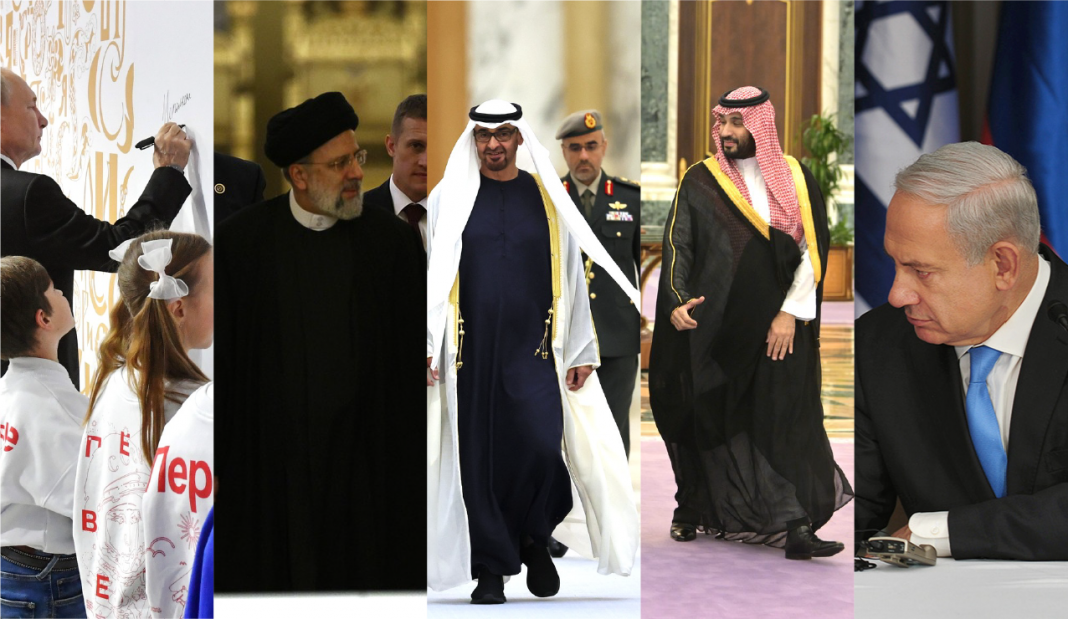This report describes the key events that significantly impacted Russia’s political, economic, and social processes.
Based on the results of the past week, the following trends can be summarised:
- The main topic that was important for Putin in communicating with the leaders of the United Arab Emirates and Saudi Arabia was a coordinated policy in the oil markets. Experience has shown that to successfully confront the United States, it is essential not only to reduce oil production volumes but also to abandon the sale of oil on US-controlled exchanges for dollars. A year ago, Saudi Arabia agreed with China to switch to the yuan when paying for oil. For Putin, agreeing on the same payment scheme was essential – but in rubles.
- Given the excitement surrounding Putin’s candidacy for the presidential election, it is needed to note that we are dealing only with a statement of intent to run. The official nomination itself will take place a little later. But Putin decided to interrupt the intrigue regarding whether he will be nominated at all or has no such intentions. The casual tone of the nomination announcement was intended to convey that for Putin, the presidency is a routine matter, and elections are also a process that one simply has to go through without focusing too much on it.
- Iran and Russia are “rogue countries” in the US and Western classification. Obviously, now Russia and Iran have many important topics, in particular, military-technical cooperation (Iranian weapons come to Russia and are used in the war against Ukraine), support for the Iranian economy (Iran began to emerge from the crisis in 2023, reducing inflation national currency and demonstrating positive trends and forecasts), the fight against possible anti-government protests, national security. It is also essential that Iran is the main sponsor of the Hezbollah movement and one of the main enemies of the State of Israel. For Putin, it was essential to understand the situation in the region, starting with Iran’s actual plans and intentions regarding Israel.
This report highlights the following topics that were most relevant for Russia during 4th – 12th of December:
1. Vladimir Putin’s visit to the International Exhibition and Forum “Russia”;
2. Vladimir Putin’s visit to the Middle East;
3. Putin’s speech at the “Russia Calling” forum;
4. Putin’s meeting with the Crown Prince, Minister of Youth, Culture and Sports of Oman Ziyazan Bin Haitham Al Said;
5. Visit of the President of Iran to Moscow and negotiations with Putin;
6. Putin’s candidacy for the 2024 presidential election;
7. Telephone conversation between Putin and Egyptian President Abdelfattah Sisi;
8. Telephone conversation between Putin and Israeli Prime Minister Benjamin Netanyahu.
This Content Is Only For Subscribers
- Vladimir Putin’s visit to the International Exhibition and Forum “Russia”
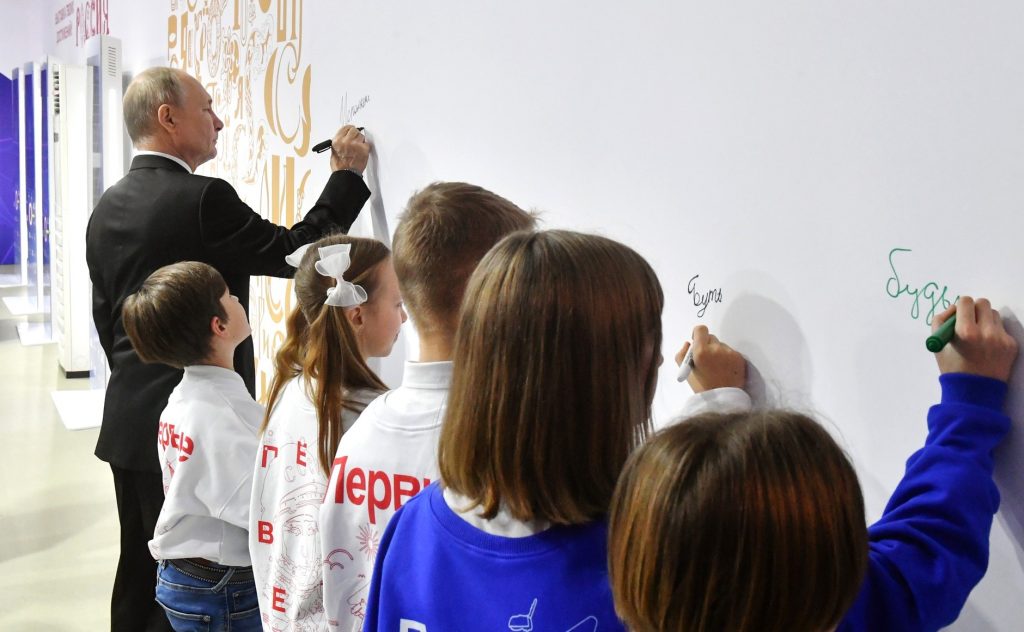
On Monday, December 4, Vladimir Putin visited the International Exhibition and Forum “Russia” at VDNKh. Surrounded by children and accompanied by government representatives and other officials, the Russian president toured the main exhibitions and installations presented at the exhibition. In particular, along with the president, the exhibition was visited by the Minister of Industry and Trade Denis Manturov, the General Director of the State Atomic Energy Corporation Rosatom Alexey Likhachev and others. It is noted that the Exhibition-Forum “Russia” opened on the territory of VDNKh in Moscow on November 4, 2023, and will last 161 days – until April 12, 2024: from National Unity Day to Cosmonautics Day.
Outcomes and outlook:
The International Exhibition and Forum “Russia” is conceived as one of the most ambitious spectacular events designed to show that Russia has withstood the pressure of sanctions and that its industry and science are developing despite the Western blockade. It is no coincidence that Putin has recently appealed to this exhibition at least three times, advising foreign leaders and diplomats to visit the exhibition to have an “adequate” understanding of Russia and the state of affairs in the Russian economy. Millions of Russians are expected to pass through the exhibition to ensure that the country has a high production potential. Ideologically, the time frame for the functioning of the exhibition is defined from the Day of National Unity (a call for further unity and rallying around the President) to the Day of Cosmonautics (as a symbol of the scientific and technological breakthrough of the USSR). It is evident that this exhibition is already becoming an element of election campaigning with an emphasis on the progress that Putin needs to demonstrate to voters.
- Vladimir Putin’s visit to the Middle East
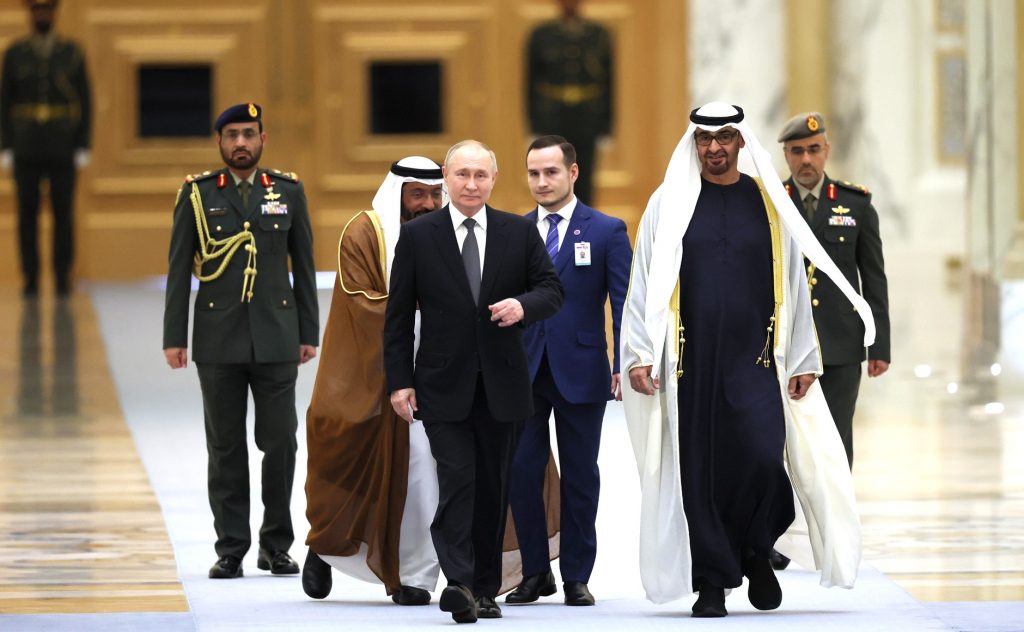
On Wednesday, December 6, Vladimir Putin’s one-day working visit to the Middle East began. The Russian president’s first destination was the United Arab Emirates, where in Abu Dhabi, he held talks with the President of the United Arab Emirates, Mohammed bin Zayed Al Nahyan. Even though the visit was a working one – that is, not the highest according to diplomatic protocol, many observers were surprised by the pomp with which the Russian president was greeted. According to official statements of the parties, during the meeting, the state and prospects for the further development of multifaceted Russian-UAE cooperation, as well as current international issues with an emphasis on the state of affairs in the Middle East region, were discussed.
Key theses:
- Mohammed bin Zayed Al Nahyan: “Relations between the Russian Federation and the UAE are historical. In recent years, relations have developed in various areas in the interests of both countries and peoples. “I would like to stress that I especially appreciate your personal role and effective role in strengthening bilateral relations.”
- Mohammed bin Zayed Al Nahyan: “The UAE is Russia’s largest trading partner in the Middle East and the Gulf region. I would also like to note that the UAE is the largest investor in the Russian economy. Over the past year, investments in the non-oil sector have grown by 103 per cent. “Especially, I would like to note that this is an unprecedented leap, which indicates the special nature of relations between our countries.”
- Putin: “The other day, the United Arab Emirates celebrated 52 years since the formation of the state. “I want to congratulate you on this and I want to remember that the Soviet Union was one of the first to recognise an independent, independent, sovereign state.”
- Putin: “Indeed, the United Arab Emirates is Russia’s main trading partner in the Arab world. Last year’s trade turnover increased by 67.7 per cent last year, and I think it will be even more this year. The same applies to investment activities.”
- Putin: “These days, one of the most significant international environmental forums is taking place in the Emirates. The first results of implementing the Paris Agreements are being summed up. As expected, this event is being held by you at the highest level, and, of course, many people in the world, far from even environmental movements, are grateful to you for this work. The Russian delegation also participates in this work at the highest level.”
On the same day, Vladimir Putin arrived in Saudi Arabia, where in Riyadh he had negotiations with the Crown Prince and Chairman of the Council of Ministers of the Kingdom of Saudi Arabia, Mohammed bin Salman Al Saud.
Key theses:
- Mohammed bin Salman Al Saud: “We can find many stories, many topics on which we share common interests, work together to achieve stability and development of the whole world, including the Middle East region. Over the past seven years, we have achieved much on our bilateral track, for example, in energy, investment relations, and the agricultural sector.”
- Mohammed bin Salman Al Saud: “Also, thanks to political cooperation and interaction, we were able to positively influence several issues in the Middle East, and this increased security. And also our subsequent political interaction and cooperation will undoubtedly positively impact the global situation.”
- Putin: “The Soviet Union was one of the first to recognise the independent state of Saudi Arabia. This was almost a hundred years ago. Our relationship developed differently during this time.”
- Putin: “During this time, a lot has happened in our relations. But over the past seven years, of course, relations have acquired a quality and reached a level that has never been seen before. And this was achieved as a result of the wise policy of your father, the Custodian of the Two Holy Mosques of the King of Saudi Arabia, with your direct participation.”
Following the Russian-Saudi negotiations, the parties signed a joint statement:
- “His Highness [Mohammed bin Salman Al Saud] and His Excellency [Vladimir Putin] held a formal negotiating session, during which the historical and strategic relations between the two friendly countries, as well as ways of their development in all areas, were reviewed. An exchange of views occurred on the current general regional and international situation.”
- “In the economic, trade and investment areas, both sides praised the increase in trade volume as bilateral trade volume in 2022 increased by 46 per cent compared to 2021.”
- “Both sides emphasised their commitment to continue working to increase mutual and joint investments in the two countries, create conditions for the private sector, exchange visits, hold joint investment forums and events, develop an attractive investment environment, provide the necessary permits and overcome any problems in this region”.
- “In the energy sector, both sides praised the close cooperation between them and the successful efforts of the OPEC Plus countries to increase the stability of world oil markets. We emphasised the importance of continuing this cooperation and the need for all participating countries to join the OPEC Plus agreement in a manner that serves the interests of producers and consumers and supports global economic growth.”
- “The two sides agreed on the importance of expanding cooperation in the following areas: (1) oil and gas, such as procurement, supply and standardisation of equipment in the field of oil and gas, research and development services in the field of oil, gas and petrochemicals, evaluation of the use of modern technologies in this field between companies of the two countries, peaceful uses of nuclear energy, electricity and renewable energy sources, including solar, wind and geothermal energy, development of projects and technologies in this field, development of supply chains for energy sectors and their sustainability, and development of cooperation between companies to maximise the use of local resources in a way that both countries contribute to achieving flexibility and efficiency in energy supply, energy efficiency, rationalisation of energy consumption and raising awareness of its importance. (2) Geoscience and knowledge sharing to enhance geotechnical capabilities through geological, mining and environmental research and to benefit from investment opportunities in sectors targeted by the Kingdom’s National Industrial Strategy, including pharmaceuticals and medical devices. (3) Environment, water resources, agriculture and food security. (4) Communications, technology and digital economy, innovation, space, transport and logistics. (5) Judicial system and justice, as well as the beginning of discussions on an agreement on cooperation between the two countries in the judicial field in civil and commercial matters. (6) Sustainable tourism and the development of tourism traffic between the two countries. (7) Sports. (8) Education, higher education, research and innovation, medical training, technical and vocational training, teaching Russian and Arabic. (9) Mass media. (10) Healthcare.”
- “In the field of international relations, the parties reaffirmed their determination to continue coordination and intensify efforts to maintain international peace and security.”
- “Both sides discussed the evolving situation in Palestine, expressed deep concern about the humanitarian catastrophe in Gaza and emphasised the need to end military operations in the Palestinian territories, as well as the need to protect civilians by international law and international humanitarian law.”
- “Regarding the crisis in Ukraine [Russian aggression against Ukraine], the Russian side expressed appreciation for the humanitarian and political efforts undertaken by His Royal Highness Mohammed bin Salman Al Saud, Crown Prince and Chairman of the Council of Ministers, including the release of several prisoners of different nationalities, and ongoing efforts in this direction.”
Outcomes and outlook:
The main topic that was important for Putin in communicating with the leaders of the United Arab Emirates and Saudi Arabia was a coordinated policy in the oil markets. Experience has shown that to confront the United States successfully, it is essential not only to reduce oil production volumes but also to abandon the sale of oil on US-controlled exchanges for dollars. A year ago, Saudi Arabia agreed with China to switch to the yuan when paying for oil. For Putin, it was important to agree on the same payment scheme – but in rubles.
They also discussed the sale of oil on national exchanges to minimise the possibility of speculative pricing of oil using brokerage mechanisms. It seems that Putin managed to convince his Arab colleagues to switch to new forms of payment. At least, this could be judged by the magnificent reception of the Russian president in the UAE and by the joyful handshake with the Crown Prince of Saudi Arabia, Mohammed bin Salman.
The remaining issues (the situation in the Middle East, the situation in Ukraine, and so on) were superficial. They did not become core during the discussion of the main topics. It should be recognised that implementing the agreements reached (with the simultaneous entry into force of agreements between Saudi Arabia and China) could become a severe blow to the US economy on the eve of the presidential elections.
- Putin’s speech at the “Russia Calling” forum
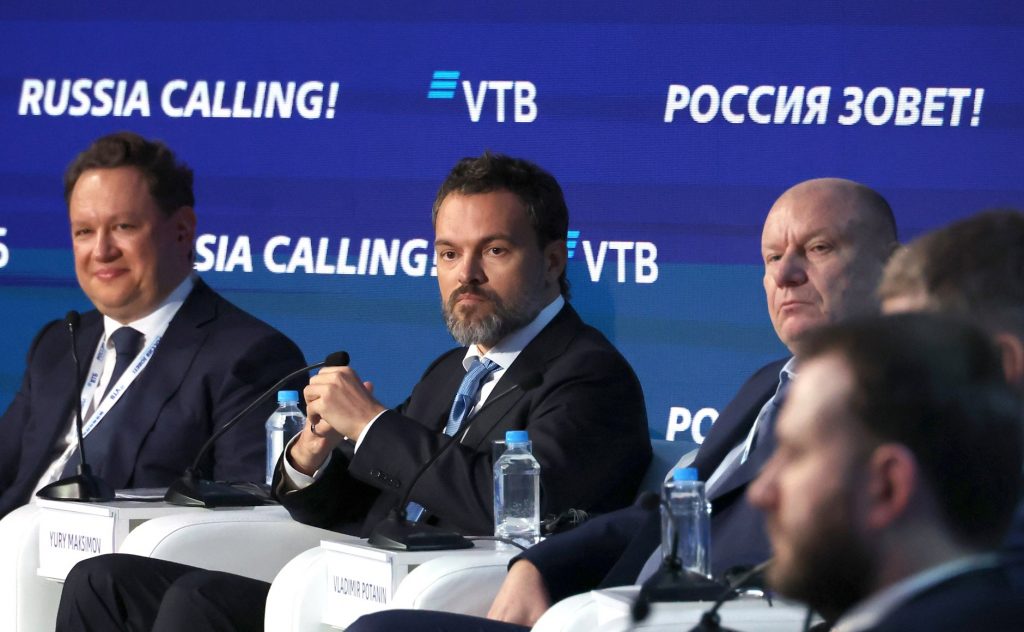
On Thursday, December 7, Vladimir Putin took part in the plenary session of the “Russia Calling!” forum. The forum’s central theme, which has been held in Moscow since 2009, was “Life without globalisation: uniting sovereign economies.” The forum itself is an investment one and is organised by VTB. Still, in his usual manner, the Russian president spoke in his speech not so much about investments as the typical narratives and political slogans.
Key theses:
- “You know that now the entire global system of economic relations is going through a stage of fundamental and, as just said, irreversible changes. They are connected with the fact that a multipolar model is replacing the previous model of globalisation.”
- “But we want to create a new model, a truly democratic one, one where the real fair competition of all participants in economic activity really takes over. This change in the landscape of the world economy, the emergence of new leaders, is an objective and in many ways a natural process.”
- “Nevertheless, the elite of Western countries – those that find themselves at the top of this process – are trying to slow it down, artificially restrain growth, as they believe, on the global periphery, which they are used to exploiting, using as a resource, as a source of rent, simply as a colony. To do this, they resort to sanctions restrictions, such as rocking the political situation and provoking conflicts in entire macro-regions to maintain their elusive dominance.”
- “Western elites have gone so far as to abolish the very principles of the market economy that they love to talk about. When this system of so-called globalisation was taking shape, we remember, people here probably remember what was said then: everyone should be on equal terms, everyone should be placed in equal conditions, borders should be open, borders should not be closed under any circumstances.”.
- “Today, we have already moved on. Through their efforts, it seemed that some unshakable postulates were crossed out. For example, property rights. Until recently, European jurisdictions were considered safe and quiet, and so-called havens have ceased to be so. Now the principle of “friend or foe” works here, as in military aircraft, where a stranger can be robbed, left with nothing, and his assets, companies, and enterprises can be blocked, taken away and even liquidated as a result of sabotage, as was the case with Nord Streams.”
- “I would like to emphasise again: the world has entered an era of fundamental changes and serious challenges not only for individual companies and industries but also for entire countries and regions of the world. Only a strong, stable and, I want to stress, I definitely want to stress this and emphasise this, a sovereign country can successfully pass this stage and become one of the centres of growth of the new global economy.”
- “We have proven that we can respond to the most difficult challenges. The Russian economy is effectively coping with external attempts to restrain the development of our country. The key was the fundamental, as it turned out, the margin of safety that we have been building over the past 20 years, especially since 2014, after introducing the first large-scale sanctions against Russia.”
- “It is expected that by the end of this year – in any case, we all really count on it – GDP will increase by at least 3.5 per cent. Agree, all the people here are literate; this is a good indicator for the Russian economy.”
- “What do I want to emphasise? We are interested in keeping our market open and competitive. This is the key to development, an incentive for the qualitative growth of domestic business and the entire Russian economy. I will repeat: Russia does not expel anyone and does not close itself off from anyone, from anyone. Many foreign enterprises and organisations, despite pressure from their governments and their officials, stated that they want to continue working in our country. We only welcome this.”
- “Over a year and a half, the number of domestic light industry companies increased by 80 per cent, furniture manufacturers – by 30 per cent, and children’s toys – by 20 per cent. During the same time, that is, over the last year and a half, the number of trademarks owned by Russian companies has increased by more than a third. What does this mean? That investments in projects to produce such products, to create new enterprises and jobs throughout the country are profitable and profitable.”
- “I would like to return to those who prophesied that because of the sanctions, our banks would stop developing and would not finance the economy. However, instead, the banking sector increased its efficiency and reached record lending volumes in the entire history of Russia.”
- “A few words about public finances. Over the 11 months of this year, the federal budget deficit amounted to 878 billion rubles, which is approximately 0.5 per cent of GDP. And suppose you look at the consolidated budget. In that case, there is a surplus of 837 billion rubles if you collect regional finances and so on. In general, the Russian financial system is in an absolutely normal, absolutely healthy state.”
- “First of all, I want to say that relations between Russia and India are developing progressively in all directions, and the main guarantor of this is the policy pursued by Prime Minister Mr. Modi. He belongs precisely to that cohort of world political figures about whom I spoke without naming names. I cannot imagine that Modi could be intimidated, intimidated or forced to take any actions, steps and decisions that are contrary to the national interests of India and the Indian people. And there is such pressure, I know. By the way, he and I never even talked about this. “I just look at what’s happening from the outside, and sometimes, to be honest, I’m even surprised at his tough position on defending the national interests of the Indian state.”
- “Yes, we all understand that, to a large extent, India receives preferences due to discounts on Russian energy resources. Well, he’s actually doing the right thing. If I were in their place, I would do the same if the situation developed this way. They make money, and rightly so. But, of course, this is not enough. We have much more opportunities. In the global ranking of the world’s economies by purchasing power parity and economic volume, India ranks third in this list, and Russia – fifth. Let me remind you, of China, the United States, India, Japan, and Russia. The world’s three largest economies by purchasing power parity.”
Outcomes and outlook:
One of the many election forums is interesting for two reasons. Firstly, it once again confirms our insides that VTB chief Andrei Kostin (who is predicted to have a high position in the government after the presidential elections) is now being strengthened. It was he who initiated the forum, and a few weeks earlier, Putin personally met with the banker and discussed budget issues with him. Secondly, what is striking is the emphasis that Putin placed on the topic of India, relations with which remained, as it were, in the shadows against the backdrop of deepening relations with China. As you know, today, India and China have many mutual claims and contradictions. Putin wonderfully understands that his every public word is studied and dissected in China. That is why curtsies towards India may indicate minor friction that is occurring with Beijing (it is essential that on this day, the President of Belarus, Alexander Lukashenko, was received in Beijing, whose every visit to the Celestial Empire is jealously perceived by Putin).
- Putin’s meeting with the Crown Prince, Minister of Youth, Culture and Sports of Oman Ziyazan Bin Haitham Al Said
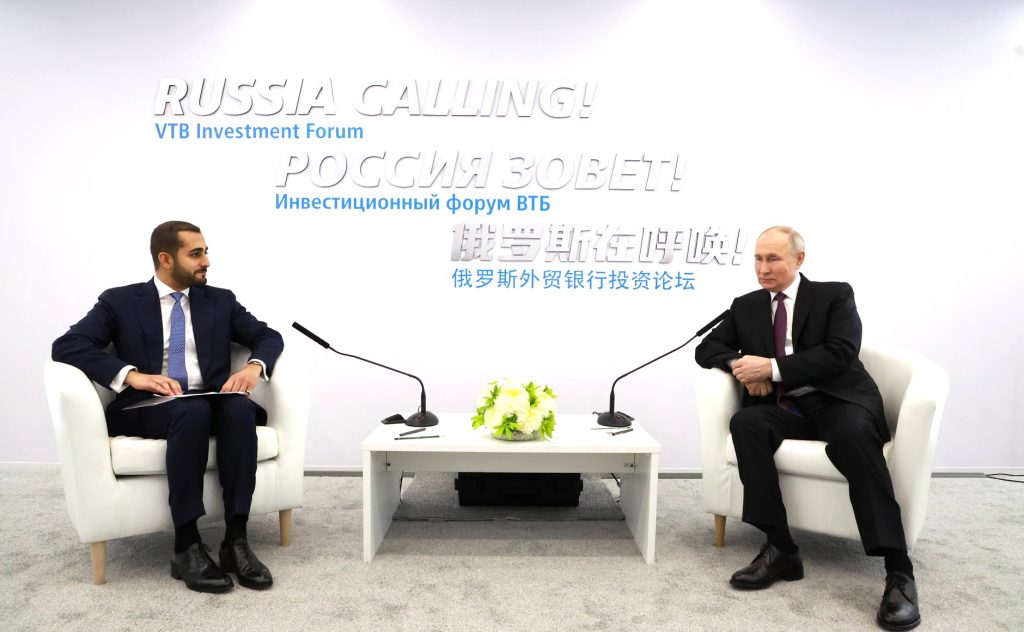
On Thursday, December 7, on the sidelines of the investment forum “Russia is Calling!” The Russian President spoke with the Crown Prince, Minister of Youth, Culture and Sports of the Sultanate of Oman, Ziyazan Bin Haitham Al Said. During the conversation, the parties discussed relations between the two states. Also, they agreed to develop ways to further strengthen economic and political relations.
Key theses:
- Putin: “Our volume of trade turnover is still modest, but it is actively developing: in the first nine months of this year, it has increased significantly. I know that you are interested in logistics projects. Today, the President of Iran, Mr. Raisi, will be our guest. He has already arrived, and we will also discuss, of course, the issue of the North-South corridor.
- Putin: “Our companies are interested in working in the energy sector. Direct flights are now open, and tourism is also one of the areas of activity, very interesting and promising.”
- Ziyazan Ben Haytham Al Said: “I agree with you that the trade and economic sphere – its results are still modest, but as a result of recent geopolitical events, there seems to be every chance for their development, regardless of any emergencies.”
- Ziyazan Ben Haytham Al Said: “I also agree that the current development of the situation throughout the world dictates the need to create new mechanisms for trade and economic interaction between countries without imposing any ideologies, without pressure from third countries.”
- Ziyazan Ben Haytham Al Said: “We remain interested in continuing investments in the Russian economy; we are investing in food security. We are developing projects in other areas, including cultural ones. We are ready to study our prospects, and I believe that we need to maintain existing communication channels, including through Mr. Kostin, and develop others.”
Outcomes and outlook:
Ziyazan (Teyazin) Bin Haytham Al Said is a young but ambitious Omani politician who plays an increasingly important role in his father’s circle, Sultan Haytham bin Tariq Al Said. In 2021, for the first time in history, 30-year-old Ziyazan was declared heir to the throne and crown prince (previously, the Sultans of Oman were elected after the death of the previous monarch). It is very important that in informal diplomacy, Oman is seen as a place for informal negotiations between heads of state and intelligence agencies around the world. Ziyazan is considered an ideal mediator between “rogue countries” (including Russia) and the Western world. He graduated from the Royal Military Academy at Sandhurst (Britain’s “training ground” for the East) and Oxford University, is integrated into the highest circles of Britain and, in fact, is seen as a negotiator with Russia (where Ziyazan also has extensive contacts among influential bankers and energy workers). That is, in essence, Prince Ziyazan’s visit should be considered not in the context of Putin’s relations with the Middle East and the countries of the Arabian Peninsula but in terms of establishing informal contacts with the West.
- Visit of the Iranian President to Moscow and negotiations with Putin
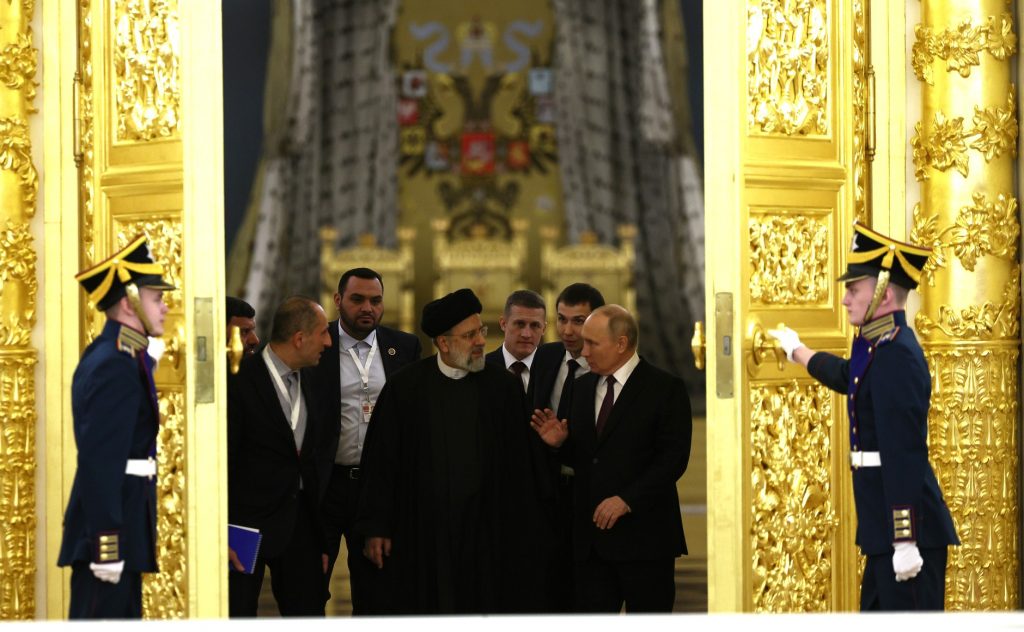
On Thursday, December 7, Vladimir Putin held talks in the Kremlin with the President of the Islamic Republic of Iran, Ebrahim Raisi, who arrived in Russia on a working visit. The negotiations began with a tete-a-tete conversation between the leaders, after which consultations continued in an expanded format as a working lunch.
Key theses:
- Putin: “Yesterday, you know, I was in the neighbouring region. I flew directly over the territory of your country to see my colleagues and wanted to land and meet right in Tehran, but they told me the President has already got ready and is flying to Moscow.”
- Putin: “We have large infrastructure projects. We have been discussing this for a long time and have now come to the practical implementation of the construction of the North-South railway. Naturally, we work traditionally in the energy and education field: we have many Iranian students studying with us. In general, work is progressing quite actively in almost all areas.”
- Raisi: “In the context of our policy to develop relations with neighbouring states, particularly with our friendly country, the Russian Federation, we observe that our interaction is progressing very well. Over the past few years, we have made progress and development. I think that today’s negotiations will also help create new favourable conditions for realising the potential opportunities that exist in our countries.”
- Raisi: “What makes humanity suffer today is the adoption of unilateral measures and a global unjust system. We can see a clear manifestation of this today in the events that are taking place in Gaza. What is happening in Palestine and Gaza is, of course, genocide and a crime against humanity.”
- Raisi: “One of the issues that I, dear Mr. Putin, would like to discuss with you is the issue of Palestine, as well as the issues of the oppressed but strong people of Palestine. According to statistics, one child dies every ten minutes. The bombing must be stopped as soon as possible.”
Outcomes and outlook:
The Iranian President’s visit occurred the day after Putin visited Saudi Arabia. Relations between Iran and Saudi Arabia have only recently normalised. Iran and Saudi Arabia are important allies of China, and Iran is separately developing relations with Russia. Iran and Russia are “rogue countries” in the classification of the United States and the West. Obviously, now Russia and Iran have many essential topics, in particular, military-technical cooperation (Iranian weapons come to Russia and are used in the war against Ukraine), support for the Iranian economy (Iran began to emerge from the crisis situation in 2023, reducing inflation national currency and demonstrating positive trends and forecasts), the fight against possible anti-government protests, national security. It is also important that Iran is the main sponsor of the Hezbollah movement and one of the main enemies of the State of Israel. For Putin, it was essential to understand the situation in the region, starting with Iran’s actual plans and intentions regarding Israel. It is obvious that the Russian leader was satisfied with the negotiations: he made it clear that the issue of opening a second front against Israel (from the north, by Hezbollah forces) depended mainly on him and his relations with Tehran (no other Western country is similar has no relationship).
- Putin’s candidacy for the 2024 presidential election
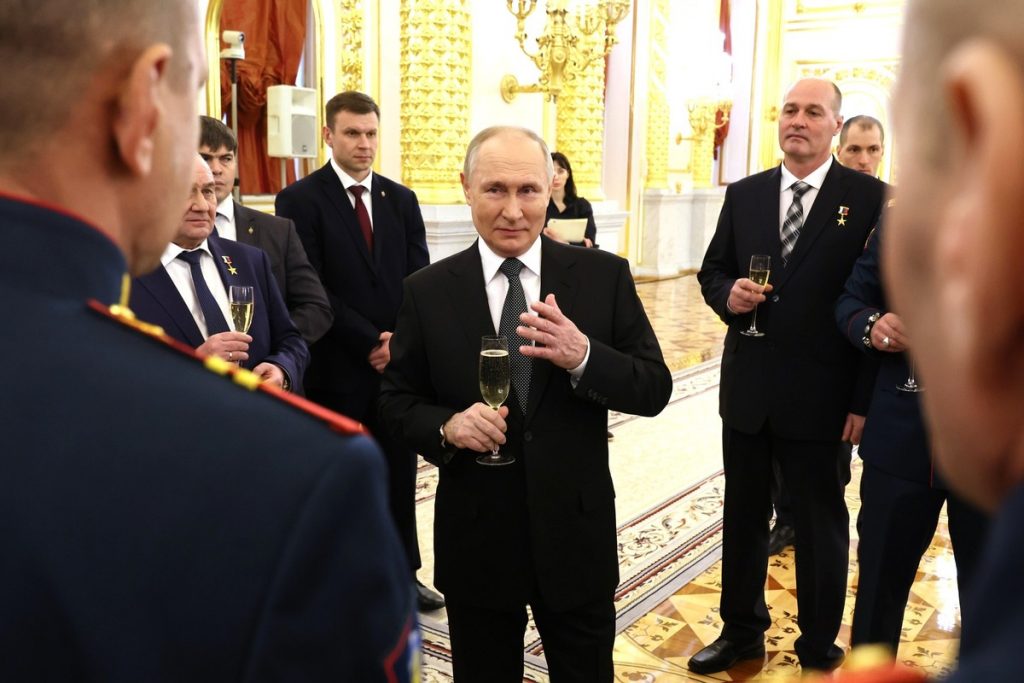
On Friday, December 8, the Kremlin hosted a ceremony to present the Golden Star medals to the Heroes of Russia, during which the Russian President conversed with the event participants. While answering a question from the “speaker” of the “parliament” of the self-proclaimed “DPR” Artem Zhoga, Vladimir Putin said that he plans to nominate his candidacy in the upcoming presidential elections: “I will not hide, different times, different thoughts. I won’t hide it; now is the time when this is needed. I will run for office.”
Outcomes and outlook:
In facy, we only deal with a statement of intent to nominate. The official nomination itself will take place a little later. But Putin decided to interrupt the intrigue regarding whether he will be nominated at all or has no such intentions. The casual tone of the nomination announcement was intended to convey that for Putin, the presidency is a routine matter, and elections are also a process that one simply has to go through without focusing too much on it. The fact that the question was asked by a representative of the “DPR”, the father of a deceased soldier and a professional military man himself, should set the tone for the presidential campaign – with an emphasis on “annexing territories”, “gathering lands”, “readiness to defend Russia’s interests by military means.” In any case, this signal shows that until the end of the presidential campaign, Russia is unlikely to make any concessions or negotiations. The level of military escalation will be pretty high – with an emphasis on the need to complete the annexation of the remaining part of the Donetsk Oblast to Russia.
- Telephone conversation between Putin and Egyptian President Abdelfattah Sisi
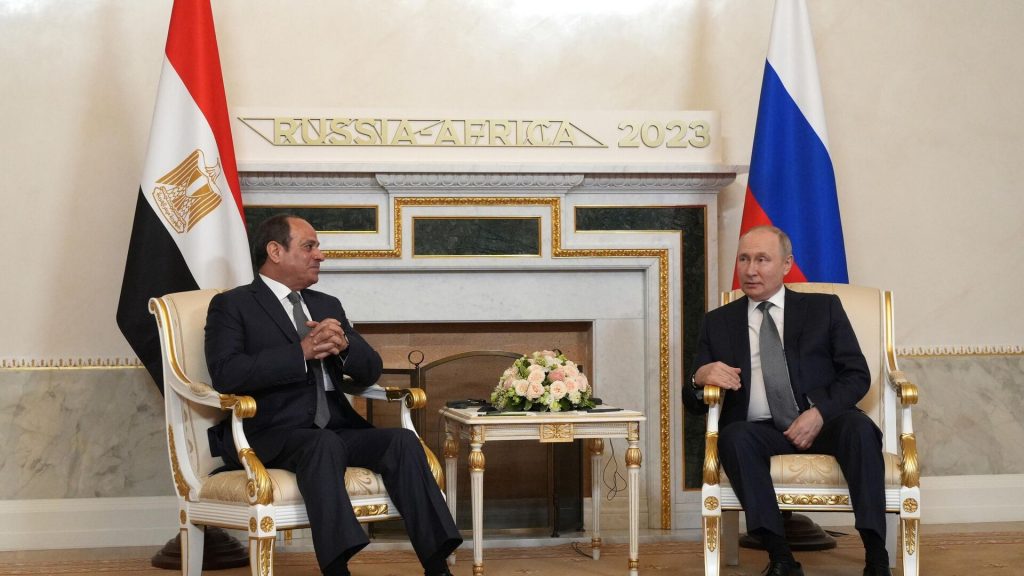
On Saturday, December 9, at the initiative of the Russian side, Vladimir Putin had a telephone conversation with Egyptian President Abdelfattah Sisi. According to a statement by the two sides, the main topic of conversation was the results of Putin’s recent trip to the United Arab Emirates and the Kingdom of Saudi Arabia, as well as negotiations held in Moscow with the President of the Islamic Republic of Iran. It is also noted that the parties discussed issues of Russian-Egyptian cooperation, which is thriving. Both sides expressed interest in its further expansion in various areas in a traditionally friendly manner based on the principles of strategic partnership. At the same time, Putin and Sisi touched upon the situation around Palestine.
Outcomes and outlook:
The conversation is meaningful because Saudi Arabia has an influence on Egypt and its politics. And also on what impact Egypt has in the Middle East region and the immediate vicinity of Gaza. In the current situation, it was important for Putin to inform about his version of the negotiations with Prince Mohammed and raise questions about Egyptian influence on the situation in Gaza.
- Telephone conversation between Putin and Israeli Prime Minister Benjamin Netanyahu
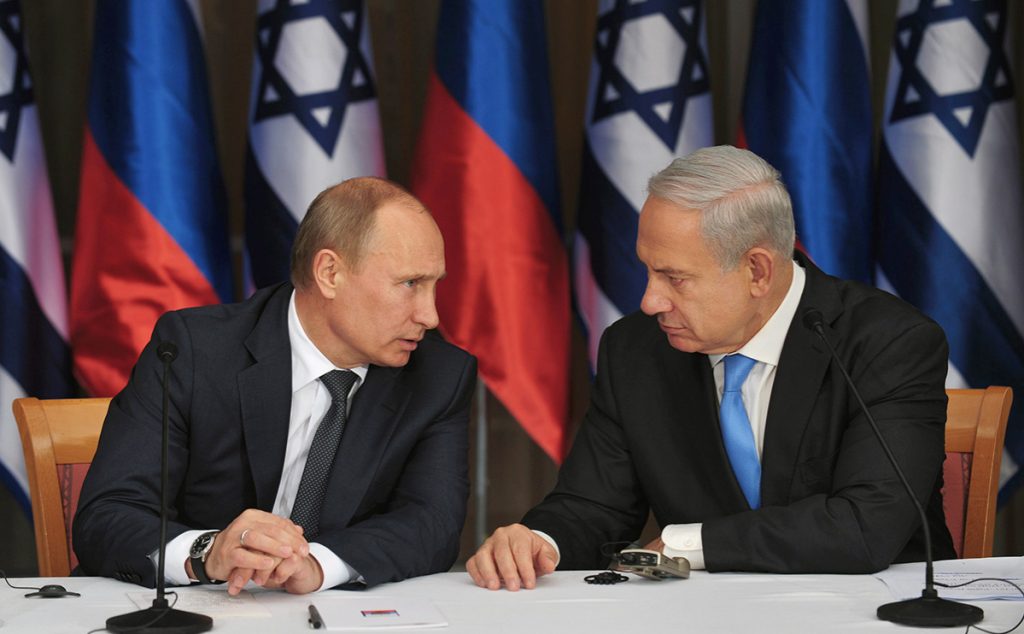
On Sunday, December 10, at the initiative of the Russian side, Vladimir Putin had a telephone conversation with Israeli Prime Minister Benjamin Netanyahu. The report published by the Kremlin indicates that the focus of the conversation was the acute situation in the Palestinian-Israeli conflict zone and, in particular, the catastrophic humanitarian crisis in the Gaza Strip. Putin confirmed his principled position of non-acceptance and condemnation of terrorism in all its manifestations.
In addition, mutual interest was expressed to continue to interact on issues of the evacuation of Russian citizens and members of their families, as well as the release of Israelis held in Gaza.
At the same time, the office of Israeli Prime Minister Benjamin Netanyahu said that during the conversation, the Israeli prime minister expressed dissatisfaction with the “anti-Israel position” expressed by Russian representatives at the UN. In addition, Netanyahu sharply criticised the “dangerous cooperation” between Russia and Iran. He said that any country that suffered a terrorist attack would respond with no less force than Israel. At the same time, it is noted that the Israeli Prime Minister thanked Moscow for its efforts to free an Israeli citizen with a Russian passport from captivity in the Gaza Strip and also asked to put pressure on the Red Cross to gain access to the hostages and deliver medicine to them.
Outcomes and outlook:
As stated earlier, Putin is showing to Netanyahu the possibility of influencing Iran to de-escalate the situation in the area where Hezbollah troops are located. Such messages are perceived in Israel as outright blackmail on the part of Russia. That is, Russia makes it clear that the attack or non-attack of Hezbollah (a more robust and organized entity than HAMAS) is an issue that should be agreed upon with Moscow, which in turn holds the key to Tehran’s position. In essence, Russia is preparing for the role of a peacemaker in the Middle East, until recently taking a wait-and-see attitude and diligently monitoring how the situation reaches a dead end. Another thing is that Western countries and Israel itself, most likely, will not allow Russia to take advantage of this role.

